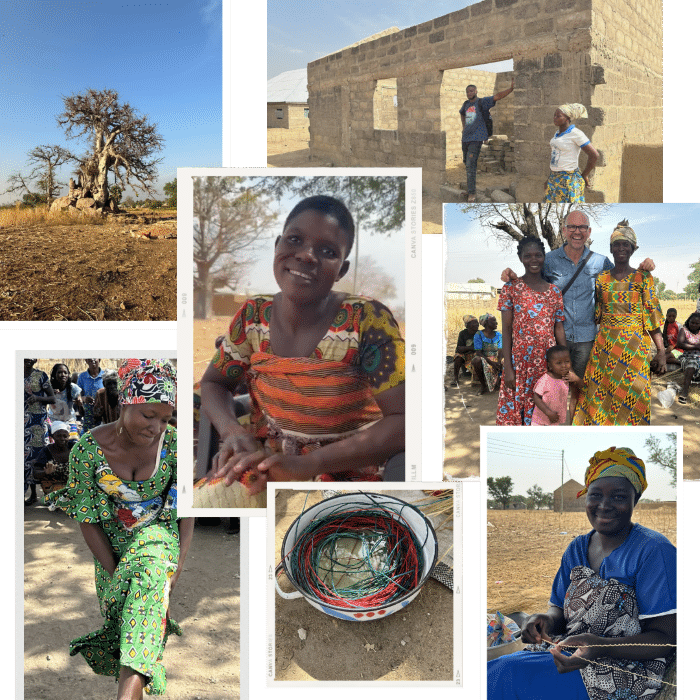VISITING THE WEAVERS
JOURNEYING THROUGH GHANA
Visiting the weavers in Ghana: Exploring ways we can improve conditions for the community.
Our recent trip to Africa at the top of January 2024, took us journeying through Ghana to visit the weavers. Our mission on this trip was to reconnect with our community of weavers and learn from them, and the ways in which we could improve their weaving environment.
We knew that gaining insight from the weavers would provide us a deeper understanding of the environmental factors that can often impact their community’s economic wellbeing. On this journey we learned that harsh weather conditions of wind and rain, can slow down the weaving process, making it difficult for the weavers to control the weave and materials used.
The impact of the environment
Intensely hot winds can dry out the elephant grass used to weave our baskets. Dry weather patterns, heat waves and minimal rain, also impacts the scarce availability of water. In result, the dry heat makes water a commodity difficult and expensive for the weavers to source.
Water is one of the main sources needed and used during the weaving process. During the weaving process, water is needed for soaking the elephant grass to make it malleable enough for bending and weaving. Another way water is used during the process, is for filling up large pots to boil and add natural dyes to. This process creates the multitude of colours which make up our unique and most popular baskets, like our Round baskets, Market baskets and oval baskets.
More exploration
On a hot Sunday afternoon, we made our way to a village called Zaare, where we met with two of our weavers Enussa and Manuru.
While we were in the village, Manuru took us to his place and showed us the dying basket process step by step. Boiling the water and adding the dye to the pots, then dunking the natural baskets into a giant pot for 5 minutes – to soak the dye through. This soaking technique is used for Unicolour baskets only. Take a closer look at our collection of unicolour baskets.
Some of the baskets aren’t dyed at all, they are left with their natural colours. These baskets are also very popular, such as the Natural round baskets and the natural market baskets.
Our pledge to support the weavers
We visited the weavers of the Asorgo Village, and spoke with our weaver Bintu. We made a pledge to donate more pots to assist them with their colour dying process. In result, the donation of new pots will allow for more efficiency and less water waste during the preparation process.
While visiting the weavers of the Amorbisi Village, we pledged to support the building of a weaving room, as seen below, The weaving room will be a creative space protected from the elements of wind and rain and will help generate an income in the community, for generations to come.
In addition to our donations, we pledged to donate $1765 for this cause.

